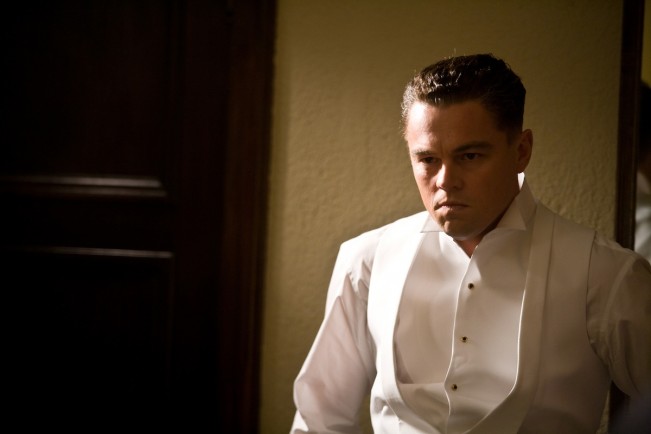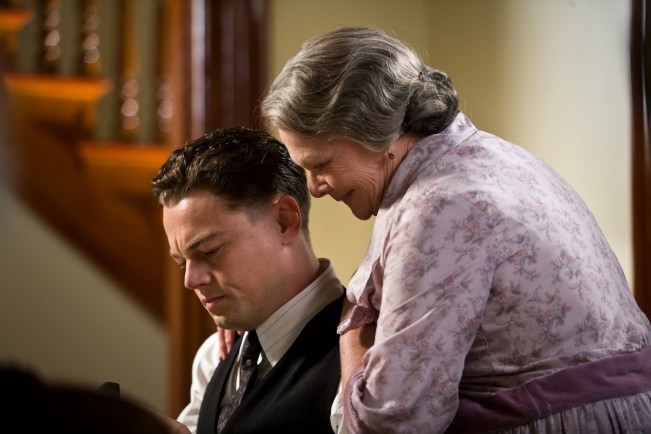

By Mike Wilmington Wilmington@moviecitynews.com
Wilmington on DVDs. J. Edgar
U.S.: Clint Eastwood, 2011 (Warner Bros.)
J. Edgar isn’t the movie I expected, but I liked it. Clint Eastwood’s noirish, moody bio-drama on the repressed life and powerful career of the FBI’s longtime founder-director, J. Edgar Hoover, with Leonardo DiCaprio giving a brilliant top-of-the-line performance as Hoover — is an absorbing film with lots of socio-political and historical meat on its sinister bones. If Eastwood hasn’t given us the Hoover who would be most acceptable to ideologues of the right (a hero-saint-tough guy), or of the left (a monster-tyrant-snoop), his film does offer a fascinating mixed picture: of (maybe) a snoop who thought he was a saint, or wanted others to believe he was — or of a would-be hero who became a tyrant, or would have, if the laws and Bill of Rights could have been bent just a little more.
It‘s the kind of risky, complex picture and lead role that don’t usually get made in the major Hollywood studios, unless somebody like the younger Oliver Stone or Scorsese or Spielberg — or in recent years, Eastwood –gets behind the project, and I‘m always glad (and even indulgent) when guys like them get the chance. The movie has received a surprisingly broad range of critical responses, but its ambitions (and its makeup) shouldn’t be held against it. Perhaps it‘s drawing that fire because movies like this one, with its pedigree — an Oscar-winning director (Eastwood), screenwriter (Dustin Lance Black of Milk), producers (Eastwood, and also Ron Howard and Brian Grazer, of A Beautiful Mind) and an Oscar-overdue star actor DiCaprio (he should have gotten one for What’s Eating Gilbert Grape, if not several others) are inevitably either praised (sometimes over-praised) to the skies of high achievement or damned to the hell of good intentions.
More important though, this is a movie you should see, both for its storytelling skills and the intense interest of the story it tells. So the hell what if it’s not constructed like the usual movie. Who wants it to be?
Eastwood’s film, like his much (and deservedly) praised 1988 bebop bio-drama Bird, follows Hoover, in defiantly non-chronological order, from childhood to his death in 1972. Like Bird, J. Edgar keeps leaping back and forth in time, as the G-Man whom Truman Capote once called a “killer fruit,” dictates his (cosmeticized) life story to a succession of handsome young men taking notes. His relationship with his longtime companion Clyde Tolson (fancily well played by Armir Hammer) is thoroughly aired.
 Part of the model for the script by Black has to be Citizen Kane, another film with a defiant non-chronology, changing perspectives and a complex narrative structure — though this movie, shot by Eastwood’s regular cinematographer Tom Stern in hazy, murky grays and blue-notes, certainly doesn’t look or feel like Kane. (No more than it feels like another black-and-white American movie classic Psycho, which nonetheless may have suggested this movie’s emphasis on Hoover‘s mother attachment and possible cross-dressing.) It feels like a sad life, revealed in pieces, about a strange man — as obsessively organized as a librarian, relentless as a detective, compulsive as a gambler.
Part of the model for the script by Black has to be Citizen Kane, another film with a defiant non-chronology, changing perspectives and a complex narrative structure — though this movie, shot by Eastwood’s regular cinematographer Tom Stern in hazy, murky grays and blue-notes, certainly doesn’t look or feel like Kane. (No more than it feels like another black-and-white American movie classic Psycho, which nonetheless may have suggested this movie’s emphasis on Hoover‘s mother attachment and possible cross-dressing.) It feels like a sad life, revealed in pieces, about a strange man — as obsessively organized as a librarian, relentless as a detective, compulsive as a gambler.
Black’s idea is to contrast the celebratory bio or tribute Hoover wants (and which, in his lifetime, he usually got) with the sordid backstage story that never got told: of a determined mamma’s boy whose domineering mother, Annie (a compellingly bossy Judi Dench) told him she ’d rather have a dead son than “a daffodil,” of a punctilious record keeper whose views on dissidents and radicals were formed in the post-WWI Palmer era, who took over the Bureau of Investigations in the ’20s, turned it into the FBI in 1935 and held unquestionable power there for nearly half a century (until 1972), in great measure though his unmatched talents for nosing out the scandals of his bosses and other political powers and then tactfully blackmailing superiors into submission. (Lyndon Johnson’s famous salty quote on Hoover went, I believe, “I’d rather have him inside the tent, pissing out, than outside the tent, pissing in.“)
 The movie subscribes to the theory that J. Edgar was motivated in part, by his own secrets and quirks: by his lifelong bachelordom, his tight ties to his mother, and his extremely close relationship with right hand FBI man and lifelong companion and traveling buddy Tolson (Capote called them “Johnnie and Clyde”), and the closeted homosexuality all those suggest. But it also suggests that the Hoover-Tolson ties were platonic, with nothing on screen here but one troubled kiss, and Tolson’s flirting, and nothing more suggested off-screen.
The movie subscribes to the theory that J. Edgar was motivated in part, by his own secrets and quirks: by his lifelong bachelordom, his tight ties to his mother, and his extremely close relationship with right hand FBI man and lifelong companion and traveling buddy Tolson (Capote called them “Johnnie and Clyde”), and the closeted homosexuality all those suggest. But it also suggests that the Hoover-Tolson ties were platonic, with nothing on screen here but one troubled kiss, and Tolson’s flirting, and nothing more suggested off-screen.
That makes sense, and more importantly, DiCaprio and Hammer make it play believably in the movie. That a man who had little sex life of his own — the only possible female partners mentioned here are ‘40s movie sarong star Dorothy Lamour, and Hoover’s longtime secretary Helen Gandy (a fine if under-used Naomi Watts), to whom he makes an odd marriage proposal and who then becomes his lifelong Girl Friday and file-shredder — would then seize and hold power by peeping into and filing away the sex lives of others, from Eleanor Roosevelt to Jack Kennedy to Martin Luther King, has a delicious irony that this movie’s gay writer and straight director don’t miss.
DiCaprio, who often looks somewhat boyish and wounded in his movies, is certainly a lot sexier, even buried under latex and body flab, than the bulldog-visaged Hoover, a man usually played on screen by classic tough guys like Broderick Crawford, Ernest Borgnine and Bob Hoskins. But that vulnerability, that wounded quality, is obviously what Eastwood and Black want to exploit. DiCaprio makes Hoover a more ambivalent figure than the rough-house way he’s almost always portrayed. The actor gives the Washingtonian Hoover his East Coast accent, his girth, his punctilious habits, as well as something he always wanted in real life: star quality. This Hoover is a poseur and a play-actor, and, most important of all, a real and believable voyeur. And though some have complained that DiCaprio’s Hoover is too sympathetic, that deceptively gentler-seeming approach makes the character, in a way, scarier: a congenital outsider, forever trying to accumulate power by burrowing deep inside and piling up dirt.
Hammer meanwhile, who played twin golden boys, The Winklevoss brothers, in The Social Network, turns Tolson into one of those effortlessly handsome clothes-horse narcissists who would probably strongly appeal to someone like the movie’s Hoover. The scenes between DiCaprio and Hammer are electric, and the two grow old together well. (In Larry Cohen’s underrated and wonderfully scummy and tabloidish 1977 The Private Files of J. Edgar Hoover, song-and-dance man Dan Dailey plays Tolson to Crawford’s Hoover.)
As for Hammer’s aging makeup job, which has been more harshly criticized than any facial in living memory — well, it certainly draws your attention and it’s certainly weird. Hammer’s old Clyde looks like his facial skin has gone white and scaly, that he’s some kind of botched mummy whose remnants of flesh are rotting right off his bones. But to say, as some reviewers have, that this movie is somehow ruined by that bizarre makeup job in a few scenes seems excessive. It‘s like saying that Bird was ruined because Forest Whitaker can‘t really play the saxophone. (Dench, by the way, is terrific in J. Edgar, but that’s almost a given.)
Some observers have also suggested that Eastwood hasn‘t explored Hoover enough — and I agree that this movie would be much more interesting if it gave us more of Hoover’s relationship with Senator Joe McCarthy and his ilk in the ‘50s Red Scare era (a high water mark of Hoover’s self-promotion), and, even more important, that the film should definitely have tried to delve into Hoover’s curious reticence through much of his career about taking on the Mafia, marked by his bizarre sometime insistence (until it became too obvious to ignore) that the Cosa Nostra was non-existent or wildly exaggerated by people like head drug cop Harry Anslinger. (If there’s one thing obvious about Hoover, it’s that he must have known there was a Mafia and known that the FBI was the right agency to face them.)
Apropos of The Outfit, I once talked to a famous moviemaker whose family had lived near Hoover in the ’50s, and he swore that Hoover had met regularly back then for park bench confabs with mob boss Frank Costello. Even if this isn’t true, and even if it doesn’t imply something more sinister (like that one persistent rumor that Hoover was being blackmailed by the mob), the fact of his notorious shyness about taking on the Mafia, when he was later so eager to undo a national African-American icon like King, is the stuff of great irony and possibly of great drama. In a way, I wish the guy who told me the story had written the movie.
Still, J. Edgar approaches and sometimes achieves, in high style, some of the irony and the drama. Bad latex or not, this show had its hooks in me from beginning to end, and DiCaprio hits acting peaks here that rank among his best, and the year’s gutsiest and most memorable. Pulling us down into Hoover’s darkness, the actor shines out like a struck match suddenly flaring in the black depths of a world we thought we know.
Extra: Documentary














Yeah! Excellent review. Too bad a lot of critics weren’t as compelling in their analysis of the film as Mr. Wilmington. The criticisms of it, while not entirely unjustified, are probably the weakest points that could be made about a film that inspires a little more thought than the usual bio flick.